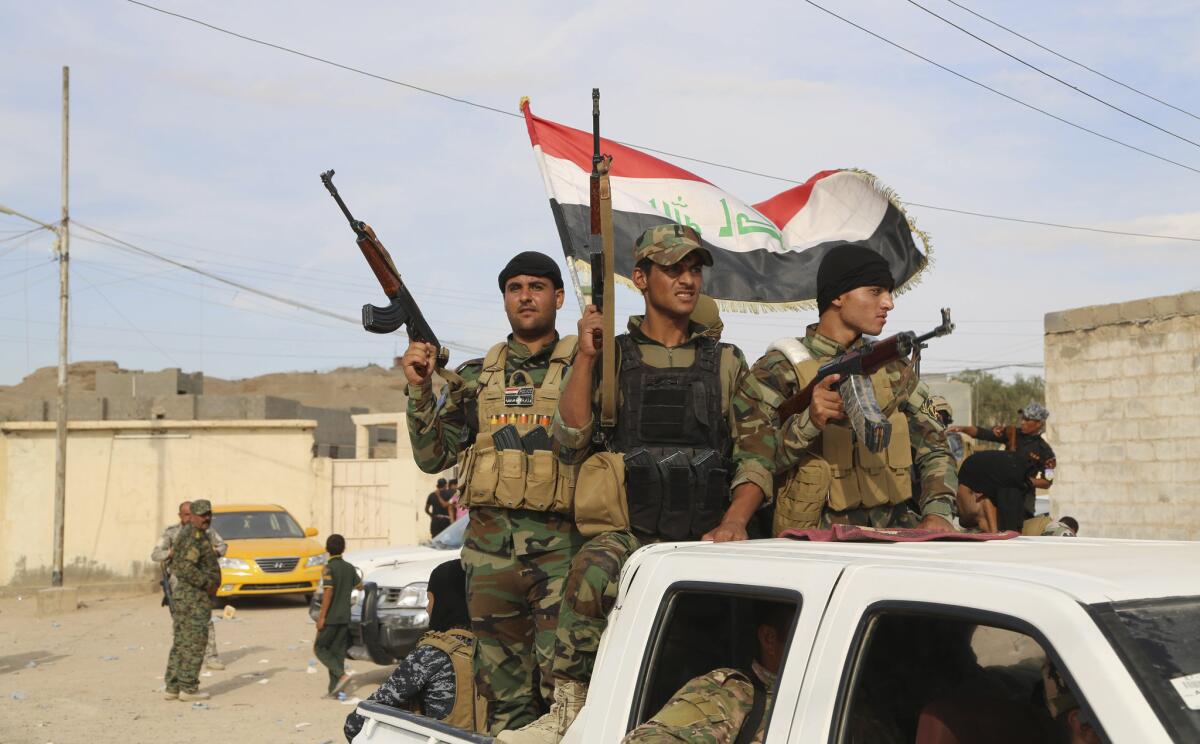Op-Ed: Islamic State’s Achilles’ heel: Its Sunni identity

Sunni volunteer fighters parade through Khalidiya, located 60 miles west of Baghdad, as they prepare to support Iraqi security forces in liberating the city of Ramadi from Islamic State group militants on Oct. 10.
- Share via
The “Islamic” identity of Islamic State has understandably attracted a lot of notice. There is no question that it is a fanatical group with a twisted religious ideology at the core of its identity. And it is the appeal of that ideology, along with the sheer thrill of adventure, that leads foreigners — in the summer, one estimate was 1,000 a month — to go to Iraq and Syria to join its ranks. It is also responsible, of course, for motivating terrorists to carry out the mass shootings and bombings in Paris, the bombing of a Russian Metrojet airliner and suicide bombings in Beirut.
The Sunni ethnic identity is both a source of strength for Islamic State and a potentially fatal weakness, if it can be properly exploited.
But Islamic State has another identity as well, one that is more important for those who actually live under its “caliphate.” It is a Sunni Arab supremacist group that champions perceived Sunni Arab interests against those of Kurds (who are also Sunnis), Shiite Muslims, Alawites, Turkmens and other ethnic and religious groups in Iraq and Syria. Those interests are as much political and ethnic as they are religious.
All of this helps explain why so many former Baathists — predominantly Sunni Arabs — are so prominent in its ranks, especially members of Saddam Hussein’s intelligence services. They see Islamic State as the best way to reassert their traditional dominance in Iraq, which they lost with Hussein’s downfall. In Syria, Sunnis were sidelined even earlier, with the rise in 1971 of Hafez Assad, father of current dictator Bashar Assad, who, under the cloak of Syria’s own Baathist party, instituted de facto rule by his extended family, all Alawites (an offshoot of Shiite Islam).
The Sunni ethnic identity is both a source of strength for Islamic State and a potentially fatal weakness, if it can be properly exploited.
The record of the last couple of years is pretty clear: Islamic State can take and hold only Sunni Arab areas. It has not been able to advance into the Shiite heartland of Iraq or the Alawite heartland of Syria. And when it overstretches and tries to hold Kurdish, Shiite or Yazidi areas, it can be pushed back.
That has happened in northern Syria, where the Kurds have wrested away the town of Kobani from Islamic State control, as well as in northern Iraq, where a force of Yazidis and Kurds backed by U.S. air power recently retook the town of Sinjar.
But Islamic State’s hold on Raqqah, in Syria, and Mosul, Ramadi and other cities in Iraq has not been shaken. They are primarily populated by Sunni Arabs (admittedly with a large Kurdish minority in Mosul) who see Islamic State’s rule as a better alternative than domination by vengeful Alawite or Shiite militias backed by Iran.
Those forces and their Iranian backers, which constitute the most powerful armed forces in both Iraq and Syria, appear to understand this. Despite endless American prodding, the Iraqi security forces and Shiite militias have been in no hurry to recapture Ramadi or Mosul because they know they can’t hold those cities. The Kurds understand it as well, which is why they are not marching into Ramadi or Raqqah either, and if they march into Mosul, it would trigger a terrible backlash among the Sunni majority there.
These realities mean that the fall of Sinjar at the hands of the Kurds, however welcome, does not signal the coming defeat of Islamic State in Iraq and beyond. The only way that will be accomplished is by mobilizing Sunni Arabs to rise up against it as they rose up against its predecessor, Al Qaeda, in Iraq in 2007.
And that won’t happen unless the U.S. and its allies offer Sunnis some assurance that they will not be trading the tyranny of Islamic State for the tyranny of Shiite rule.
In Iraq, Sunnis need to be offered a Sunni regional government, akin to the Kurdish regional government, with its autonomy protected by its own militia and ultimately guaranteed by the United States. If Baghdad won’t go along, the U.S. should bypass Baghdad and directly arm and train the Sunni tribes. In Syria, Sunnis need to be offered a future in which they won’t be terrorized by Assad and Shiite militias.
In other words, the U.S. needs to make clear its intent to topple Assad along with Islamic State. Declaring no-fly zones to ground Assad’s air force and safe zones to limit his forces from advancing into Sunni areas would be a good start.
Until that happens, the U.S. can continue to chip away at the edges of Islamic State, backing Kurdish offensives in Iraq and Syria and dropping bombs on terrorists like Jihadi John. But it won’t defeat Islamic State, which, as the attacks from Paris to Sharm el Sheik prove, is becoming increasingly dangerous. This is an evil that cannot, contrary to what President Obama says, be contained. It must be defeated. And the only way to do that is to turn Sunni Arabs — its popular base — against it.
Max Boot is a contributing writer to Opinion, a senior fellow at the Council on Foreign Relations and the author of “Invisible Armies: An Epic History of Guerrilla Warfare from Ancient Times to the Present Day.”
Follow the Opinion section on Twitter @latimesopinion and Facebook
More to Read
A cure for the common opinion
Get thought-provoking perspectives with our weekly newsletter.
You may occasionally receive promotional content from the Los Angeles Times.









